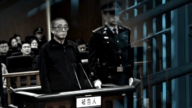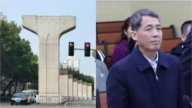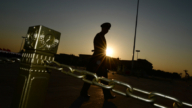【新唐人2013年08月02日讯】中共建军日之前的31号,手握军权不到一年的习近平再次晋升6名新上将。其中,一半是今年刚获上将资历即获得提拔。这也是习近平担任军委主席以来,第2次晋升上将。港媒透露,习近平为巩固军权更是打破了以往的晋升惯例。分析认为,这显示习近平已经掌控了北京军区,巩固了北京地盘,但目前中共面临四面楚歌,即使习近平掌握了军权,也无法挽回中共政权的颓势。请看报导。
这六名中共新上将分别是总政治部副主任吴昌德、总装备部政治委员王洪尧、军事科学院政治委员孙思敬、北京军区政治委员刘福连、南京军区司令员蔡英挺、广州军区司令员徐粉林。其中吴昌德、王洪尧和蔡英挺今年才满足晋升条件。但条件充足的沈阳军区政委褚益民却落榜。晋升的条件是中将资历4年,正大军区职务2年。
原国务院研究中心研究员姚监复对香港《明报》表示,资历刚满足即获提拔的军官会对习近平更加忠诚,使他进一步巩固军权。姚监复还认为,军权是否稳固,更是取决于总参谋部、总政治部、总后勤部、总装备部四大总部,和各大军区的一把手效忠于谁。
《明报》还透露,习近平在日前军委的会议上宣布,今后大军区正职的提名权在他本人,别人一概不得提人选,大军区副职也必须由他本人决定。这打破了江胡时代军中人事由军委高层或军中元老提名建议的惯例。
其实,习近平在去年11月刚接任中共中央军委主席后,立即授予新任二炮总司令魏凤和上将军衔,由于当时他尚未出任国家军委主席,这一做法被外界称为是“违宪”的破例行为﹔而去年原驻港司令张仕波发表坚决拥护习言论后,从候补委员升为中央委员,从驻港司令直升北京军区司令,也是破例。
时事评论员蓝述:“目前面对这样一个非常尖锐的社会矛盾,中共急需要用军队来维持它统治的稳定性。很显然,谁能掌握军队的绝对的领导权,那么,谁在党内的说话的声音就会大。”
时事评论员蓝述表示,习近平提升的6名上将中还有是江系背景的,这说明他在军内还没有树立起绝对的权威,还需要搞派系平衡。
1954年生的蔡英挺是最年轻上将,他曾任原军委副主席张万年的秘书,而张万年是江泽民的铁杆嫡系。
北京时政观察人士华颇却表示,地位和荣誉是军人的生命,习近平只要提升了他们,他们就会效忠,尽管他们可能来着不同阵营。但华颇也注意到,他们在晋升仪式上表现出了拘谨和紧张。
北京时政观察人士华颇:“习近平给他们上将,给他们这么大的恩典,使他们紧张,觉得不知道怎样报答习近平﹔第二,有些人可能来自于不同的阵营,以前效忠过其他的人,这回改换门庭,要效忠习,怎么对以前的老东家交帐。”
华颇指出,习上台后,通过视察陆海空、二炮、武警部队,加上晋升军衔基本上控制了枪杆子,这次又晋升北京军区政委,进一步巩固了北京地盘。他可以用部队为他推行新政保驾护航了。
华颇:“只有把北京地盘掌握了,才能以中央正统的地位号令全国。当初毛泽东发动文革,华国锋粉碎‘四人帮’都是首先掌握北京的部队。”
蓝述指出,面临目前这么尖锐的社会矛盾,这么严重的党内腐败问题,中共一定会土崩瓦解,就像前苏联的巨变和当前的中东茉莉花革命一样,与军队掌握谁的手上没有太大关系。
采访/易如 编辑/宋风 后制/陈建铭
Xi Jinping Promotes Six More Officers to Generals
On July 31, the eve of the Chinese Communist Party (CCP)
Army Day, Xi Jinping promoted six more officers to generals.
Three of the six new generals just became eligible
this year for promotion to the rank of general.
This is the second time that Xi, as head of Central Military
Commission (CMC), has promoted the army generals.
Hong Kong’s media reveals that Xi has broken with
tradition in promotion of military leaders.
Analysts say, this shows that Xi has gained overall control
of the Beijing Military Region and cemented his position.
Yet, in reality, the CCP has been mired in dire straits.
Analysts believe that Xi’s gaining of military power
cannot stop the CCP from going towards collapse.
The names of six new generals are as follows:
Wu Changde, deputy chief of the General Political Dept.
Wang Hongyao, political commissar of the
General Armament Dept,
Sun Sijing, political commissar of the Academy of
Military Sciences,
Liu Fulian, political commissar of Beijing Military Region.
Cai Yingting, Nanjing Military Region commander.
and Xu Fenlin, Guangzhou Military Region commander.
Wu Changde, Wang Hongyao, and Cai Yingting just
meet all promotion requirements this year.
Chu Yimin, political commissar of Shenyang Military Region,
meets the same criteria, however, failed in this promotion.
The criteria for promotion is 4-year service of Lieutenant
General, plus 2-year tenure as Military Region Leader.
Hong Kong’s Ming Pao quotes Yao Jianfu, a retired
researcher at State Council Research Center.
Yao says that the newly promoted officers who just met the
promotion requirements will be more loyal to Xi Jinping.
This will help Xi to further cement his control of the army.
Yao states that the security of military power depends
on the loyalty of the chief leaders of the four general
departments of the People’s Liberation Army(PLA).
Ming Pao reports at a recent military commission meeting,
Xi Jinping declared his exclusive right to appoint
Military Region leaders in the future.
The nomination is also for Military Region deputy chiefs.
This breaks with the precedent formed in era of
Jiang Zemin and Hu Jintao.
Based on the old rule, Military Region leaders were
nominated by CMC top levels or by old heads in the army.
In November 2012, Xi took over as the CMC chief.
He soon promoted Wei Fenghe, commander of
the 2nd Artillery Corps, to the grade of general.
Then Xi only served as the CCP’s CMC chief,
instead of national CMC chief.
His rank awarding was considered “unconstitutional".
Zhang Shibo, commander of the PLA Hong Kong garrison,
openly pledged his loyalty to Xi Jinping in 2012.
Afterwards, Zhang was promoted to the member of the
CCP Central Committee, from an alternate member.
He was named as Beijing Military Region commander.
Critic, Lan Shu: “Now in facing such a sharpening
of social conflict, the CCP is in dire need of the army to help maintain
its political rule.
Obviously, who has real control of the army is the one who
has bigger decision-making power in the CCP."
Lan Shu states that some of six new generals
were involved in Jiang’s faction.
This shows that Xi has not yet established
his absolute authority in the army.
Xi still needs to keep a balance among the CCP factions,
says Lan Shu.
The youngest general, Cai Yingting, was born in 1954.
Cai was once the secretary of Zhang Wannian,
former CMC vice chairman.
Zhang Wannian is known as a hardcore loyalist to
Jiang Zemin.
Beijing’s political observer, Hua Po, believes that
rank and honor is the life for an army man.
Those officers will show loyalty to Xi who has promoted
them, though they come from different factions.
They looked reserved and nervous at the rank
awarding ceremony, says Hua Po.
Hua Po: “Xi Jinping made them become generals,
which is a great honour.
This made them nervous, as they don’t yet known
how to repay Xi.
Secondly, some of them may come from different camps.
Now they want to switched to serve Xi, they feel
nervous on how to settle accounts with their old patron."
Hua Po believes that Xi has basically controlled the army
through his inspections and rank promotions.
Political commissar of the Beijing Military Region
is also on the latest promotion list.
This helps stabilize Xi’s turf in Beijing.
Hua Po remarks that Xi can be escorted by troops
on his path of new administration.
Hua Po: “By securing a control over Beijing makes
it possible for Xi to command the whole country.
On historical precedent, Mao Zedong controlled
Beijing troops before launching the Cultural Revolution.
So did Hua Guofeng for his defeat of the Gang of Four."
Lan Shu says that the CCP has been riddled with
sharp social contradiction and serious corruption.
This makes the CCP doomed to collapse.
The same thing happened in former Soviet Union and
in the Middle East uprising.
Lan Shu believes that these regime endings do not
have much to do with the control of the army.






























